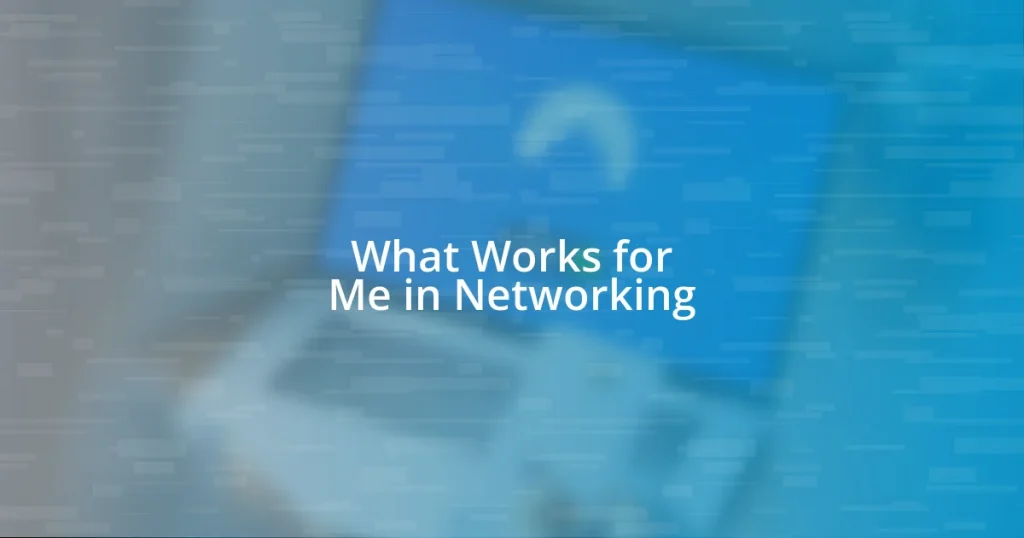Key takeaways:
- Effective networking goes beyond exchanging contact information; it involves active listening, building authentic relationships, and engaging meaningfully with others.
- Setting clear networking goals aligned with personal values enhances the quality of connections and encourages genuine interactions.
- Measuring networking success focuses on the quality of relationships, mutual support, and reflecting on the impact of interactions rather than just the number of contacts.
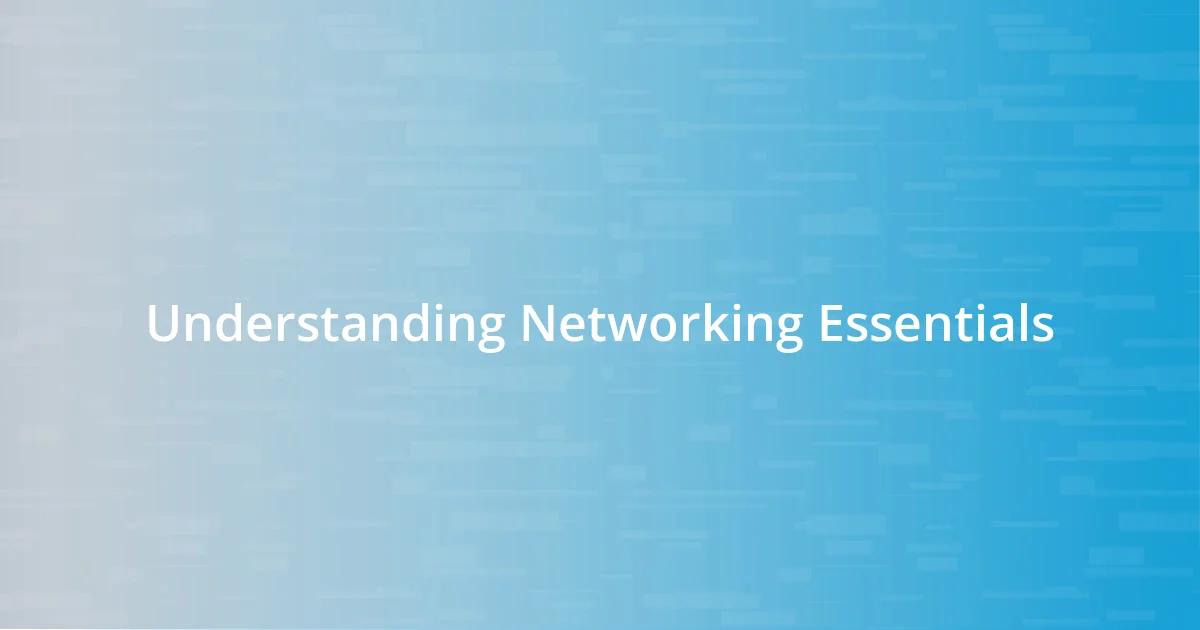
Understanding Networking Essentials
Networking essentials are often more than just exchanging business cards; it’s about building relationships that can lead to mutual opportunities. I still remember a networking event where I struck up a casual conversation with someone over coffee, and it surprisingly turned into a collaboration that lasted for years. Have you ever considered how a simple chat can open doors that you never anticipated?
Active listening is another vital element in networking that I’ve found invaluable. Early in my career, I attended a seminar where the speaker emphasized the importance of truly hearing what others are saying rather than just waiting for my turn to speak. It shifted my approach dramatically. Have you ever caught yourself thinking about your response while someone else is talking? Relaxing into the conversation and being present can lead to deeper connections.
Finally, maintaining authenticity in your networking efforts is crucial. I once met someone who seemed to put on a façade of success, and I felt a disconnect because it didn’t feel genuine. Trust is built on honesty and authenticity, don’t you think? I’ve learned that sharing my true self, flaws and all, often attracts the kind of connections that are the most meaningful.
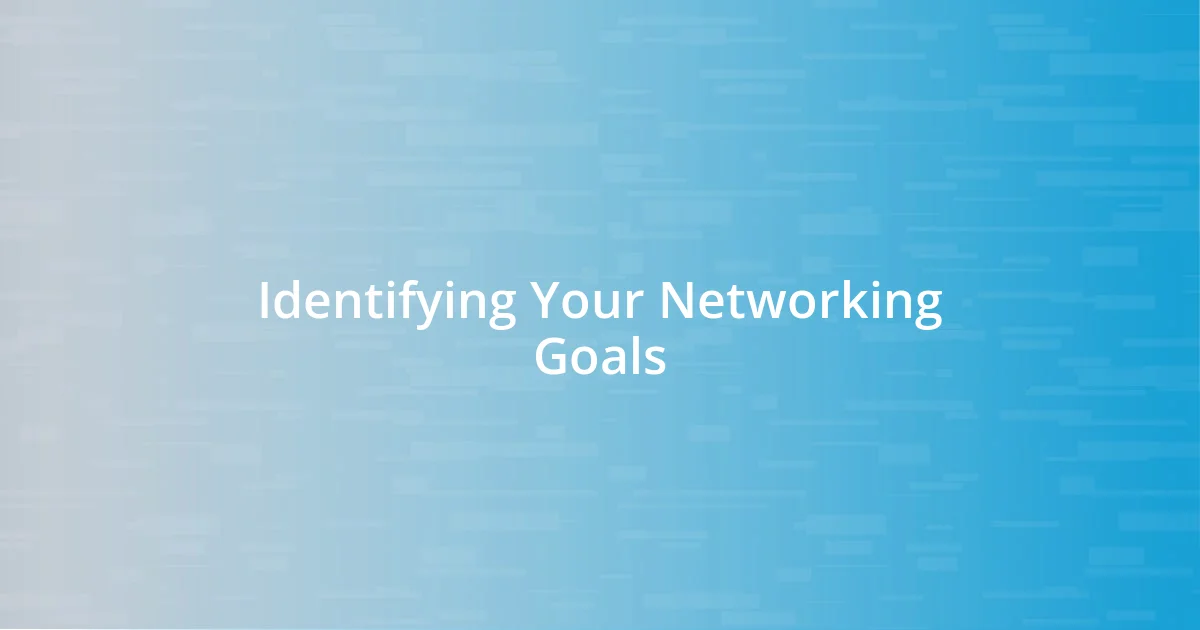
Identifying Your Networking Goals
Identifying networking goals is a foundational step for effective networking. Personally, I like to start by asking myself what I hope to achieve. Am I looking for mentors, potential collaborators, or simply a larger circle of contacts? Setting these goals helps clarify my intentions, which in turn, informs how I engage with others. It’s remarkable how a well-defined goal can shape the direction of your interactions.
Another aspect I find crucial is the alignment of my goals with my personal values. For instance, when I established a goal to connect with individuals who are passionate about social impact, I felt more inspired and energized during meetings. Have you ever experienced that spark when you meet someone who shares your values? That enthusiasm not only strengthens my networks but also fosters authenticity in every conversation I have.
Lastly, I firmly believe in the importance of regularly reassessing these goals. In my own experience, what I wanted from networking changed over time, often influenced by my personal and professional growth. Keeping a pulse on my goals helps me stay true to my vision and adapt to new opportunities. It’s a bit like gardening—sometimes you need to prune and nurture to see the best results.
| Type of Goal | Description |
|---|---|
| Mentorship | Connecting with experienced individuals for guidance. |
| Collaboration | Finding partners for projects or initiatives. |
| Friendship | Building personal connections that provide support. |
| Knowledge Sharing | Exchanging insights and learning from others. |
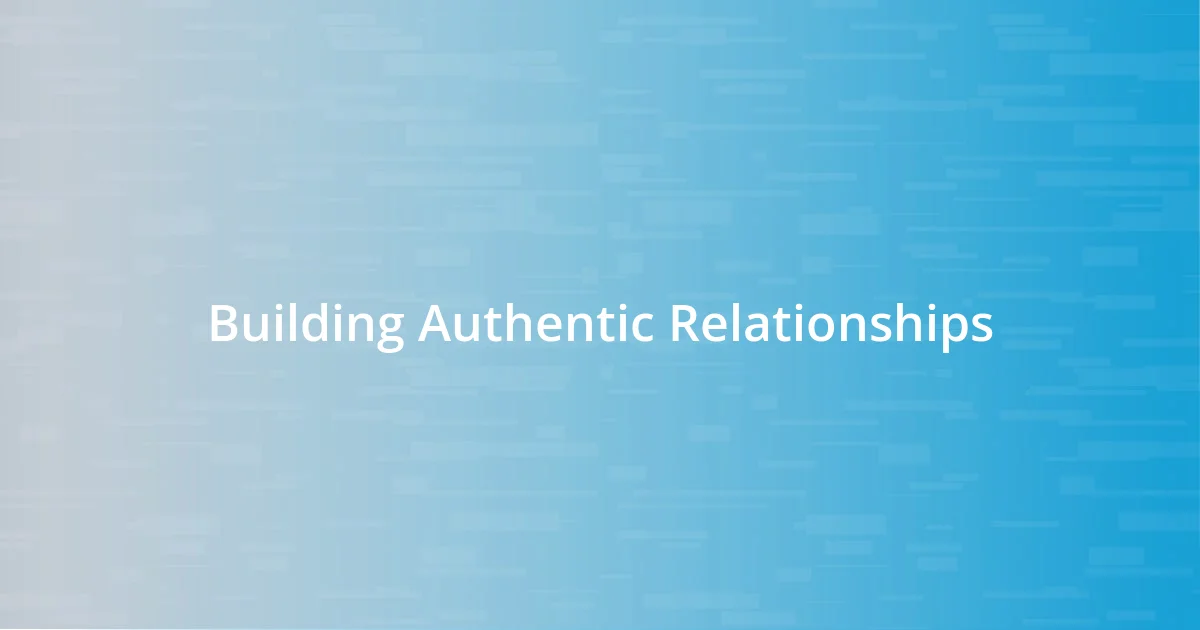
Building Authentic Relationships
Building authentic relationships is at the core of effective networking. I recall a time when I attended a community event, where I struck up a conversation with someone about our shared love for local art. By expressing genuine interest, I learned about their projects, and we soon discovered synergies that blossomed into a collaboration. It was in that moment I realized that vulnerability and honest curiosity pave the way for lasting connections.
To deepen these authentic relationships, consider the following:
- Be Vulnerable: Share your thoughts and experiences honestly; it encourages others to do the same.
- Follow Up: After an initial meeting, reaching out with a personalized message goes a long way in reinforcing the connection.
- Seek Common Interests: Finding shared passions helps solidify bonds beyond professional needs.
- Offer Help: Being supportive without expecting anything in return often fosters loyalty and trust.
- Stay Present: When you’re talking, put away distractions and focus entirely on the other person.
Authenticity isn’t just about being genuine; it’s about creating a safe space for open dialogue. I remember a networking lunch where someone opened up about their career struggles. It indelibly shifted the atmosphere from stiff small talk to heartfelt sharing. That vulnerability led to a deeper exchange, and unexpectedly, we became allies, supporting each other through our respective journeys. Building connections in such a manner isn’t just about the network you create; it’s about the meaningful relationships that enrich your life.

Utilizing Social Media Effectively
Social media has become a powerful tool in my networking arsenal. I often find that platforms like LinkedIn and Twitter can serve as valuable spaces for professional connection. For example, I remember reaching out to someone who had posted an insightful article on industry trends. We ended up having a lively conversation that not only expanded my perspective, but also led to a productive collaboration. Have you ever wondered how a single tweet can open doors you never knew existed?
Crafting a strong online presence is essential. I’ve learned that consistency in my posts and engagement helps to showcase my expertise while also reflecting my personality. Sharing my thoughts on relevant topics allows others to see the real me, which I believe turns casual followers into potential allies. I can’t stress enough how important it is to interact genuinely. Commenting thoughtfully on others’ posts makes them feel valued and can help forge deeper connections.
Utilizing social media effectively also means being strategic about what I share. I recall a time when I curated a list of resources that assisted others in my field, and the positive feedback I received was overwhelming. It felt rewarding to help, and it reinforced my value in the community. Have you thought about how sharing your expertise can elevate your presence? Remember, your insights can resonate with others and position you as a go-to resource in your network.

Following Up with Purpose
Following up isn’t just a formality; it’s a powerful opportunity to reinforce connections. I remember attending a seminar where I connected with a speaker after their presentation. A few days later, I sent a message thanking them and shared a thought about their topic. To my surprise, they replied with insights that sparked an engaging discussion, strengthening our connection. How often do you seize such moments?
When I follow up, I aim for authenticity and purpose. I never just send a generic “great to meet you” message. Instead, I reference our previous conversation or share an article related to our discussion. This not only shows that I listened but also creates a more meaningful dialogue. Have you noticed how a personalized touch can turn a fleeting encounter into a genuine relationship?
Patience is also crucial in the follow-up process. There was a situation where I followed up with someone several times over a few months before we finally met for coffee. At first, it felt like I was pushing too hard, but I remained committed. Eventually, we connected, and that relationship became a cornerstone of my professional journey. This taught me that meaningful connections sometimes take time to develop, and persistence can pay off in unforeseen ways. Are you ready to invest in your relationships by following up with intention?
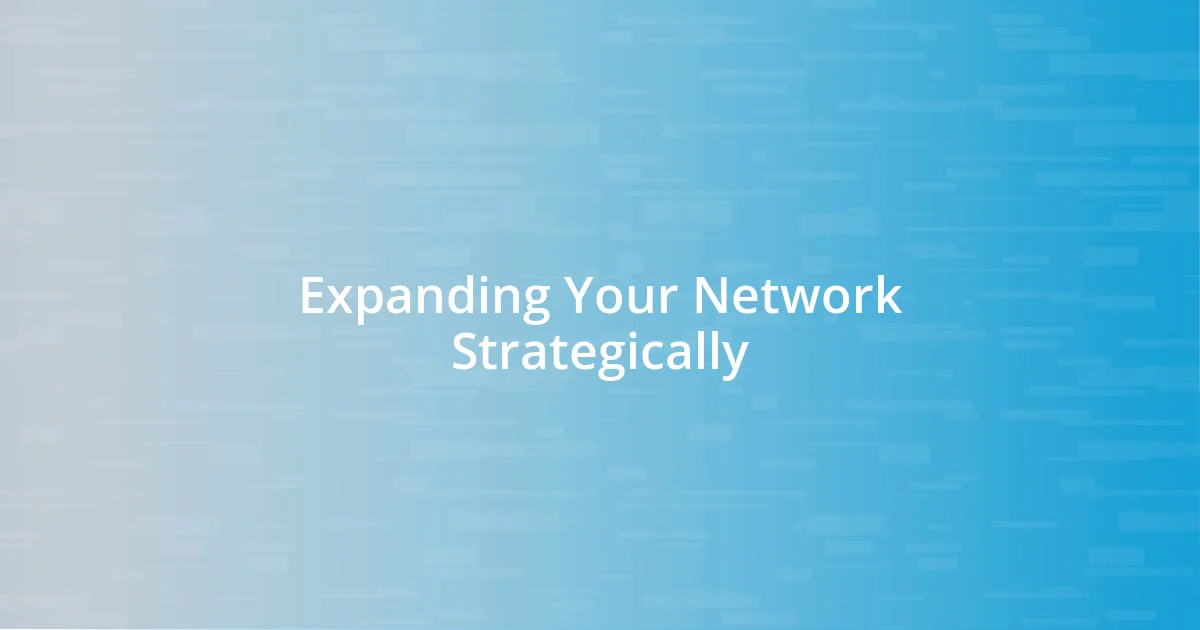
Expanding Your Network Strategically
Expanding my network strategically requires a blend of thoughtful intention and adaptability. I’ve found that attending niche events or workshops specific to my industry often leads to richer conversations. For instance, at a recent conference for tech enthusiasts, I struck up a dialogue with someone who had a unique perspective on emerging trends. That conversation turned into a collaborative project months later. Have you ever noticed how some of the best connections happen when you least expect it?
One effective strategy I use is to identify key individuals or organizations that align with my goals. I make a habit of researching thought leaders who share my interests and values. This way, when I introduce myself, I can tailor my message to resonate deeply with them. I remember reaching out to a founder of a successful startup, mentioning a shared interest in sustainability initiatives. That personalization led to an invitation to join their upcoming roundtable discussion—an opportunity I never would have had without that strategic approach. Are you taking the time to pinpoint those influencers in your field?
Additionally, I’ve learned to be mindful of the platforms I choose for networking. While everyone flock to the big names like LinkedIn, I’ve found success in joining smaller, community-focused forums and groups, where people are often more open and approachable. In fact, I once joined an online community for local entrepreneurs, and through an engaging exchange about our challenges, I met a mentor who became instrumental in my growth. It made me question: how diverse is your networking approach? Sometimes, the most valuable connections lie where you least expect them.
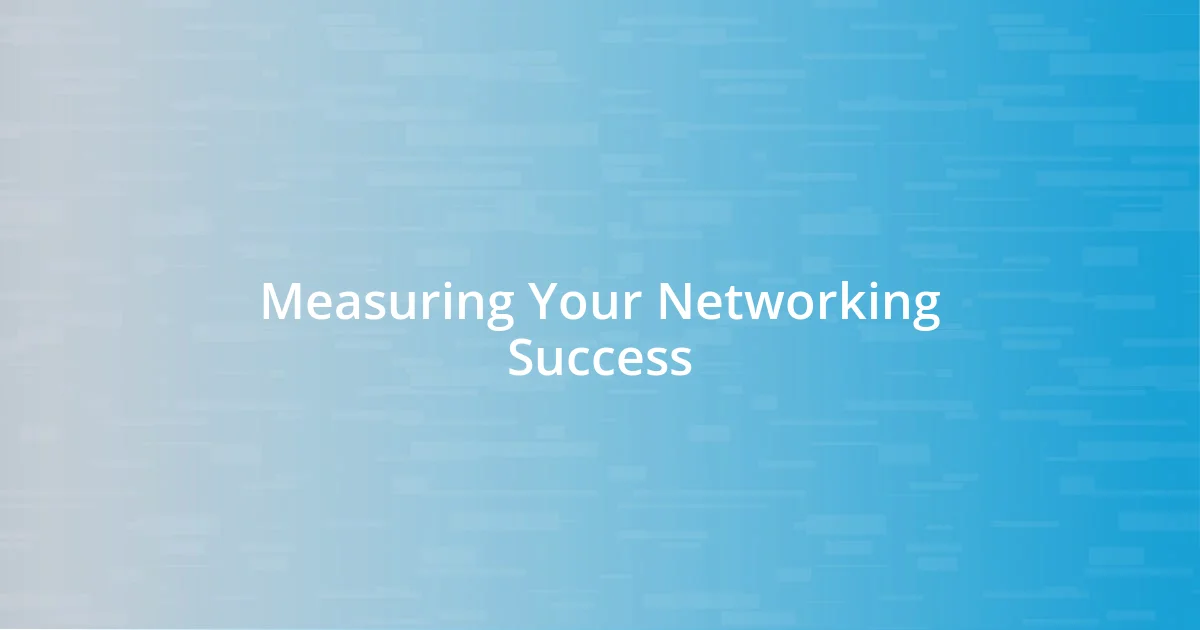
Measuring Your Networking Success
Measuring networking success isn’t just about the size of your contact list; it’s about the quality of your relationships. I remember a period when I started keeping track of the meaningful connections I made. I created a simple spreadsheet to log who I met, what we discussed, and any follow-up actions. This practice helped me see patterns in my networking efforts and evaluate which relationships deserved more attention. Have you ever thought about how simple metrics can clarify your networking objectives?
Another effective way I’ve gauged my networking success is by reflecting on the outcomes of my connections. For instance, after an insightful meeting with a new contact, I often look back to see how the conversation influenced my projects or decisions. I recall one coffee chat that led to my joining a collaborative initiative, which opened doors I hadn’t anticipated. Recognizing these successes not only validates my efforts but inspires me to keep reaching out. How often do you take a moment to reflect on the impact of your networking?
Lastly, I believe the ultimate measure of networking success is the support system you build over time. I tend to evaluate my network by how often we support one another, whether through referrals, resources, or emotional encouragement. There was a time a fellow contact helped me prepare for a challenging presentation, and later I guided them through job search strategies. This reciprocal relationship has blossomed into a robust support network that I value immensely. Have you considered how your connections can uplift and empower each other in your professional journeys?











